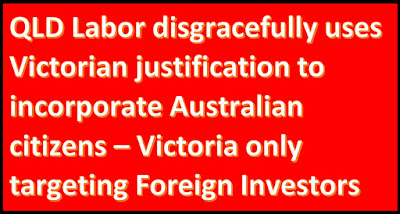As you may be aware, the Land Tax & Absentee Surcharge on Australian properties is applied in Victoria as well, however Australian (and NZ) citizens are exempt. In June 2015 a report (No, 1, 58th Parliament) was released titled 'Inquiry into the State Taxation Acts Amendment Bill 2015'.
The inquiry was conducted at the Legislative Council by the Economic & Infrastructure Committee. The inquiry's intention was to look particularly at the likely impact of the Bill on housing supply & affordability. The Bill was passed.
So as to delve further into the reasoning for imposing the Land Tax & Absentee Surcharge on Australian citizens by the QLD Labor Government, I thought it helpful to see why Victoria imposed it upon Foreign investors.
_______________________________________________________________________________
The Bill's objective for creating the Absentee Surcharge was outlined in Part 4:
"Foreign investors do not pay local taxes (such as GST or income tax) over an extended period of time. These taxes are used by governments to provide services (such as parks, public transport, schools, etc) which can affect the value of a property. Witnesses from the Department of Treasury and Finance indicated that the purpose of the proposed surcharge was to ensure that foreign buyers contributed to the provision of government services."
During the public hearings witness Mr Michael Brennan - Economic Deputy Secretary, explained the justification for the Absentee Surcharge,
"It is largely about ensuring that foreign investors who gain the benefit of the capital appreciation and price growth, particularly pursuant to state government investment in services and infrastructure, pay their fair share for those things. It obviously does have some bearing on housing affordability.
Both surcharges aim to ensure that foreign buyers are contributing fairly to the provision of government services. In Victoria government services are obviously funded by a wide range of commonwealth and state own source revenue lines, and local property owners contribute to many of these tax bases over an extended period of time and therefore carry a greater weight of the tax burden required to develop and maintain government services. Conversely, foreign buyers of real estate are generally limited to property-based taxes such as land transfer duty, land tax and, at the commonwealth level, capital gains tax and any tax on income earned in Australia, which may well be limited." (page 12)
He later added,
"Both of the surcharges aim to ensure that foreigners and temporary residents contribute a fairer share to the provision of services that increase their capital growth. To the extent that either surcharge corrects for the implicit transfer from local taxpayers to foreign investors, this may remove some of the incentives at the margin for foreign investors to buy residential property in Victoria, and it may make local Victorian buyers relatively more competitive in the housing market. There may be, for example, a reduction in incentives for foreign individuals purchasing single investment properties or temporary residents purchasing homes." (page 12)
And again,
"Mr BRENNAN—As I said at the outset, it is important to remember that the primary motivation is essentially the equity motivation, so it is to ensure that when foreign investors are purchasing property in Victoria and thereby moving forward over the longer term and benefiting from the investments made in services and infrastructure via capital growth, that they are effectively paying a fair share of that potential capital upside.
As I say, that is the primary motivation, so it is less about discouraging foreign investment as ensuring that where foreign investment occurs, the foreign investor is adequately paying for the benefit that they will receive." (page 13)
COMMENT:
It is clear that Queensland Labor under Palaszczuk have copied and pasted this 2015 justification for imposing the Land Tax & Absentee Surcharge in Victoria into their own explanation speech, used by Treasurer Curtis Pitt. But QLD Labor extended it to include Australian citizens.
As I have explained in previous postings/articles - this justification is flawed because of the FACT that most Australian citizens who are absentees DO contribute to local taxes in many forms.
Most Australian absentees are inextricably connected to Australia in other financial ways such as through Superannuation, savings accounts and other investments - through which they are paying taxes.
Australian absentees cannot be grouped into the same category as foreign investors, which is why the Victorian government sensibly, respectfully and ethically did not include them in their Land Tax & Absentee Surcharge.
In respect to Australian absentees, the Property Council of Australia's Executive Director Chris Mountford said, "In some circumstances, they are being punished for investing foreign-earned income back into Queensland" (See article in the Brisbane Times - I would never have invested into Queensland property ).
This is further evidence of how Australian citizens are linked to and contributing to the Australian economy and paying taxes.
Hypocritically, The Queensland Labor Government under newly elected Palaszczuk in 2015 is alleged to have declared within a day of the Victorian government's announcement of their new taxes, words to the effect of "Come to Queensland; we are not going to impose this tax" (as stated by witness Craig Whatman - see page 37 of report).
As we know, in 2 years time she back-flipped on that comment, already having deceptively luring in many unwary investors into the trap of buying into Queensland property. They were then stung with Palaszczuk's version of the retrospectively applied Land Tax and Absentee Surcharge. If this was a company it would be charged with fraud.


No comments:
Post a Comment
Note: only a member of this blog may post a comment.